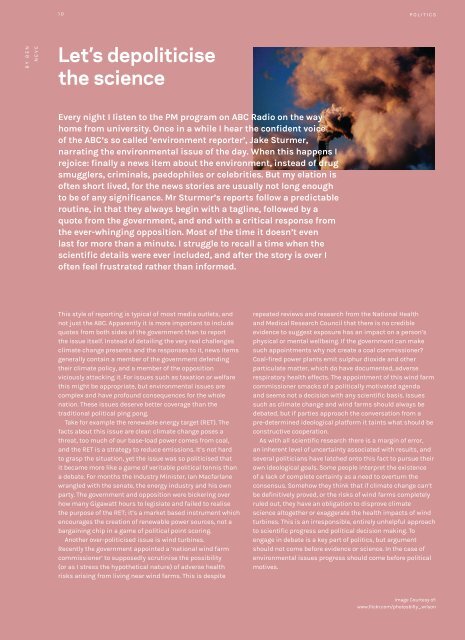You also want an ePaper? Increase the reach of your titles
YUMPU automatically turns print PDFs into web optimized ePapers that Google loves.
10<br />
POLITICS<br />
BY BEN<br />
NEVE<br />
Let’s depoliticise<br />
the science<br />
Every night I listen to the PM program on ABC Radio on the way<br />
home from university. Once in a while I hear the confident voice<br />
of the ABC’s so called ‘environment reporter’, Jake Sturmer,<br />
narrating the environmental issue of the day. When this happens I<br />
rejoice: finally a news item about the environment, instead of drug<br />
smugglers, criminals, paedophiles or celebrities. But my elation is<br />
often short lived, for the news stories are usually not long enough<br />
to be of any significance. Mr Sturmer’s reports follow a predictable<br />
routine, in that they always begin with a tagline, followed by a<br />
quote from the government, and end with a critical response from<br />
the ever-whinging opposition. Most of the time it doesn’t even<br />
last for more than a minute. I struggle to recall a time when the<br />
scientific details were ever included, and after the story is over I<br />
often feel frustrated rather than informed.<br />
This style of reporting is typical of most media outlets, and<br />
not just the ABC. Apparently it is more important to include<br />
quotes from both sides of the government than to report<br />
the issue itself. Instead of detailing the very real challenges<br />
climate change presents and the responses to it, news items<br />
generally contain a member of the government defending<br />
their climate policy, and a member of the opposition<br />
viciously attacking it. For issues such as taxation or welfare<br />
this might be appropriate, but environmental issues are<br />
complex and have profound consequences for the whole<br />
nation. These issues deserve better coverage than the<br />
traditional political ping pong.<br />
Take for example the renewable energy target (RET). The<br />
facts about this issue are clear: climate change poses a<br />
threat, too much of our base-load power comes from coal,<br />
and the RET is a strategy to reduce emissions. It’s not hard<br />
to grasp the situation, yet the issue was so politicised that<br />
it became more like a game of veritable political tennis than<br />
a debate. For months the Industry Minister, Ian Macfarlane<br />
wrangled with the senate, the energy industry and his own<br />
party. The government and opposition were bickering over<br />
how many Gigawatt hours to legislate and failed to realise<br />
the purpose of the RET; it’s a market based instrument which<br />
encourages the creation of renewable power sources, not a<br />
bargaining chip in a game of political point scoring.<br />
Another over-politicised issue is wind turbines.<br />
Recently the government appointed a ‘national wind farm<br />
commissioner’ to supposedly scrutinise the possibility<br />
(or as I stress the hypothetical nature) of adverse health<br />
risks arising from living near wind farms. This is despite<br />
repeated reviews and research from the National Health<br />
and Medical Research Council that there is no credible<br />
evidence to suggest exposure has an impact on a person’s<br />
physical or mental wellbeing. If the government can make<br />
such appointments why not create a coal commissioner?<br />
Coal-fired power plants emit sulphur dioxide and other<br />
particulate matter, which do have documented, adverse<br />
respiratory health effects. The appointment of this wind farm<br />
commissioner smacks of a politically motivated agenda<br />
and seems not a decision with any scientific basis. Issues<br />
such as climate change and wind farms should always be<br />
debated, but if parties approach the conversation from a<br />
pre-determined ideological platform it taints what should be<br />
constructive cooperation.<br />
As with all scientific research there is a margin of error,<br />
an inherent level of uncertainty associated with results, and<br />
several politicians have latched onto this fact to pursue their<br />
own ideological goals. Some people interpret the existence<br />
of a lack of complete certainty as a need to overturn the<br />
consensus. Somehow they think that if climate change can’t<br />
be definitively proved, or the risks of wind farms completely<br />
ruled out, they have an obligation to disprove climate<br />
science altogether or exaggerate the health impacts of wind<br />
turbines. This is an irresponsible, entirely unhelpful approach<br />
to scientific progress and political decision making. To<br />
engage in debate is a key part of politics, but argument<br />
should not come before evidence or science. In the case of<br />
environmental issues progress should come before political<br />
motives.<br />
Image Courtesy of:<br />
www.flickr.com/photosbilly_wilson


















